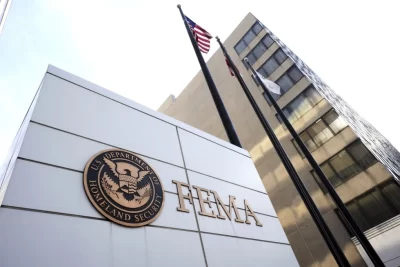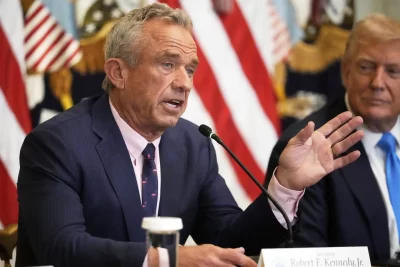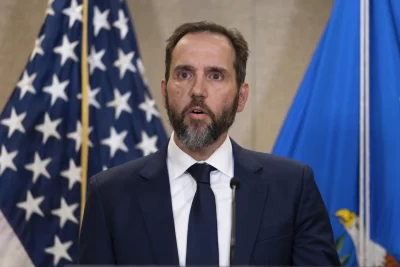Turnover has plagued local election offices since 2020. One swing state county is trying to recover

Stacks of paper too thick for Luzerne County's election equipment are seen in the county's warehouse in Wilkes-Barre, Pa., Wednesday, Sept. 13, 2023. (AP Photo/Sait Serkan Gurbuz)
The polls had just opened for last year’s midterms in Pennsylvania when the phones began ringing at the election office in Luzerne County.
Polling places were running low on paper to print ballots. Volunteers were frustrated, and voters were getting agitated.
Emily Cook, the office’s interim deputy director who had been in her position for just two months, rushed to the department’s warehouse. She found stacks of paper, but it was the wrong kind — ordered long ago and too thick to meet the requirements for the county’s voting equipment.
Conspiracy theories swiftly began to spread: Republican polling places were being targeted; Democrats overseeing elections were trying to disenfranchise Republicans.
“The feeling early on in the day was panic — concern — which grew to overwhelming panic,” said Cook, a 26-year-old native of Luzerne County. “And then at some point throughout the day, there was definitely a feeling of people are starting to point fingers — before the day was over, before things were even investigated.”
The paper shortage, corrected later in the day, turned out to be an administrative oversight by a new staff but has had consequences that are still rippling through the county of 200,000 voters, sowing doubt about how elections are run and leading to a congressional hearing.
It also serves as a cautionary tale about the perils of a change that has been largely hidden from public view but has transformed the election landscape across the U.S. since the 2020 presidential election: an exodus of local election directors and their staff.
Election offices have been understaffed for years. But 2020 was a tipping point, with all the pandemic-related challenges before the presidential vote and the hostility afterward driven by false claims of a stolen election.
A wave of retirements and resignations has followed, creating a vacuum of institutional knowledge across the country. Experts in the field say widespread inexperience creates risk in an environment where the slightest mistake related to voting or ballot counting can be twisted by conspiracy theorists i nto a nefarious plot to subvert the vote.
“People growing weary of dealing with the constant criticism, the unending workload, the inability to have any sort of work-life balance at all, and then finding themselves constantly in the spotlight and under scrutiny has, I think, put us in a national crisis,” said Jennifer Morrell, a former local election official in Utah and Colorado. “This feels like a really precarious spot.”
In Pennsylvania, officials estimate 40 of the state’s 67 county election offices have new directors or deputy directors since 2020. The turnover is even more stark in other presidential swing states. In Nevada, election directors in 11 of 17 counties will be overseeing their first presidential election next year, while in Arizona at least 12 of 15 counties have lost at least one top election official.
In North Carolina, where the Republican Legislature recently moved to gain more control of state and local election boards, roughly a third of 100 county election directors have left since the 2020 election.
The dangers are not lost on Al Schmidt, a Republican who helped oversee elections in Philadelphia and faced death threats in 2020. Now Pennsylvania’s top election official, Schmidt said his department has been working to increase training materials and build relationships among local election officials in the hopes of reducing future mistakes.
“There are no redoes of Election Day,” Schmidt said. “Everything has to be right, and it has to be right every time.”
That has not been the case in recent years in Luzerne County. The 2022 ballot debacle, referred to locally as “papergate,” was just the latest problem in a county that is on its fifth election director in the three years since the 2020 presidential election.
The troubles have only increased doubts among voters, some of whom were already distrustful of elections because of the persistent falsehoods about the last presidential contest — despite Republicans holding 10 of 11 seats on the local governing board.
“We’ve had a whole host of things that have gone on in this county where people sit back now, the electorate sits back and goes, ‘They’re just rigging the election,’” said County Controller Walter Griffith Jr., a Republican and longtime resident. “I try to tell people we got to figure out a way to get past all of those things because you’re not going to win anything and you’re not going to make anything better by doing that.”
There’s no one reason for why the county has experienced so much turnover in its election office, but there is little doubt the churn has added to problems confronting the department. Staffers reported finding instructions about important election procedures written on scraps of paper.
Griffith and others note recent hires have lacked significant election experience.
“They’re brought in because a lot of people don’t want to work in elections, and that’s understandable with so much divisiveness,” said Denise Williams, a Democrat who chairs the Board of Elections, a citizen group formed under the county charter that, among other duties, certifies election results.
Cook understands the pressure first hand. Hired as an administrative assistant, she found herself serving as interim deputy director within a year despite having no previous election experience. When she started in September 2021, the director who hired her gave his notice on her first day. His replacement was on the job about eight months before he, too, left.
“Just in the two years that I’ve been here, I find it difficult to believe when somebody starts that they’re going to be here for the long haul,” Cook said. “I don’t begrudge anybody that has left. It is a very difficult role to be in.”
Nationally, the harassment of election workers has drawn the attention of Congress, state lawmakers and law enforcement. During a 2021 congressional hearing, Schmidt quoted one of the threats he had received: “Tell the truth or your three kids will be fatally shot.” Lawmakers in several states have increased criminal penalties for those who threaten election workers, and the Justice Department has formed a task force that has charged more than a dozen people across the country.
In Luzerne County, the distrust of elections has sometimes boiled over in public meetings. One recent meeting of the elections board focused almost entirely on ballot drop boxes, a frequent target of conspiracy theories. A few cities within the county have banned them, and the board was considering whether to replace one that had to be moved as a result.
Public comment was dominated by those who don’t trust the boxes and who feel the board is ignoring their concerns. They called on the board to release security footage of drop boxes from previous elections.
“If you really have nothing to hide, then why aren’t you doing whatever it takes to be transparent — particularly knowing of all the problems we’ve had in the elections over the last few year?” one resident asked the board.
Frustration also was evident during a congressional hearing last spring into the paper ballot shortage during the midterms. One local resident, Theodore “T.J.” Fitzgerald, told lawmakers the Democrat-led board of elections was “more interested in drop boxes than making sure there were policies and procedures.” Fitzgerald, who has called for leadership changes and more training for election workers, also represents the county’s political transformation.
A former Democrat, he said he is now unhappy with both major parties and has started his own group of like-minded conservatives. County voters, in previous elections, backed Democrats Al Gore, John Kerry and Barack Obama, but then twice voted for Trump.
Of the local election office, Fitzgerald said he knows they are trying to improve: “But they are not coming through when you need them the most,” he said. “It would be nice for nothing to happen.”
District Attorney Sam Sanguedolce, a Republican elected in 2021, said he was disappointed the congressional hearing was held before his investigation into the paper shortage was complete. He said there was no evidence of voter suppression.
Local election officials were in a tough position trying to explain what happened given the active investigation, Sanguedolce said.
“No matter what you were going to say, it was going to be twisted by people who wanted things to be twisted,” he said.
U.S. Rep. Bryan Steil, a Republican from Wisconsin who chairs the committee that held the hearing, said it provided important answers and accountability for local residents.
A new county manager, Romilda Crocamo, was hired earlier this year — responsible for overseeing everything from Luzerne County’s airport and roads to the election office. She has brought in a consultant to create an elections manual so there will be no confusion about what needs to be done if an employee leaves.
She also has been encouraging staff to be more accessible, hold public demonstrations showing how they work and provide regular updates on election preparations, including how they handle unexpected problems — like a recent glitch that mixed up city council races on some ballots.
“When you don’t do that, then the stories start morphing into something that really isn’t happening,” Crocamo said. “We have nothing to hide.”
As the county prepares for municipal elections in November, the memory of the last one and its aftermath remains fresh for Cook. She recalls angry voters showing up at the election office, contentious public meetings and law enforcement officials warning her about threats.
“I wish there were words to describe the feeling of sitting in a room with detectives from the district attorney’s office and the sheriff and being told, ‘This is what people are saying about you, you need to be careful,’” she said.
After that meeting and being told that she deserved to be executed, Cook said she considered leaving the job.
“There’s only one way to fix what’s happened in this office, and it’s not by quitting and leaving it in further turmoil,” she said. “Two years from now, somebody could make the same mistake. But I’m here. I lived it, and I’m never going to make the mistakes again.”
___
This story was first published on Oct. 22, 2023. It was published again on Oct. 23, 2023, to correct that US Rep. Bryan Steil is from Wisconsin, not Illinois.
___
The Associated Press receives support from several private foundations to enhance its explanatory coverage of elections and democracy. See more about AP’s democracy initiative here. The AP is solely responsible for all content.





